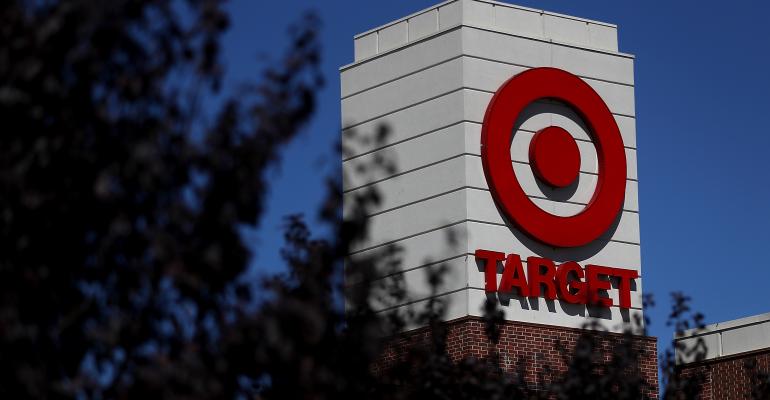(Bloomberg)—When Brian Cornell joined Target Corp. three years ago, the cheap-chic retailer was reeling from slumping sales and a hacking attack that exposed the personal data of millions of customers.
He simplified things by pulling the company out of Canada, farming out its drugstore business and focusing on the stylish clothing and home décor items for which “Tar-zhay” is famous. Now facing increased competition from Amazon.com Inc. and a resurgent Wal-Mart Stores Inc., Cornell, 58, has responded by unveiling a $7 billion plan to open smaller urban stores, remodel others and lower prices. That figure doesn’t include the $550 million he just paid to acquire web delivery startup Shipt. Bloomberg News Senior Reporter Matthew Boyle sat down with Cornell to discuss strategy, and how he’ll weather what some are calling the retail apocalypse.
We’re here in your new store in New York’s Herald Square, across the street from Macy’s, the poster child for struggles of traditional retailers. Reading the business pages today, you’d think the retail industry is on life support. Explain to us why you think it’s not.
Cornell: U.S. consumers still shop retail stores. And despite the headlines, about 90 percent of all retail sales still happen in stores. We are seeing traffic growing in our stores. But there is no room for poorly run retailers in America today.
Herald Square is one of 100 new stores you’re opening over three years in cities and on college campuses. They’re more productive sales-wise but costlier to operate. How do you know you're making the right, long-term bet here?
Cornell: We’ve been testing and learning for several years now. We were really disciplined and patient—and at times, a bit surgical—about making sure we understand how the customer was reacting. The biggest learning was that every store has to be customized to the local neighborhood, so every small store is a little bit different. In certain neighborhoods, it’s about moms with kids, so we need places to park strollers, and we overemphasize [kids’ apparel brand] Cat & Jack. But in other areas we take a different approach. And products from local artists make a huge difference.
Meanwhile, what are you doing to make the shopping experience better in your existing stores?
Cornell: We’re expanding the beauty category, and in wine and craft beer. We just unveiled a new line of wines, California Roots, all sold at $5 a bottle. We’ve added dedicated team members who only work in the food department. And we have an opportunity to grow our own-brand food business. In apparel, 90 percent of everything we sell is our own brand. In food, it’s just in the low teens.
While you’re trying to fix food, Wal-Mart is making a bigger push online in two of your key categories—home and apparel. They’ve acquired Bonobos and ModCloth and just signed a deal with [Hudson Bay Co.’s] Lord & Taylor to add their products next year. How will you respond?
Cornell: It’s a different direction for them, but we’re focused on what is best for our business. While others are buying brands, we are building them. Apparel is our core business, and it’s something we’re really good at. We’ve been driving market share gains in apparel now for several years. We’ve had one of our best years in home in a decade. There are lots of opportunities for us to continue to grow market share.
Such as?
Cornell: In men’s apparel, we’re excited about reaction to Goodfellow & Co. It’s a bit of white space for us and there is more that we can do with men.
You’ve raised your full-year earnings guidance twice this year—but some said that was easy, as you had set the bar so low. How would you respond to that criticism?
Cornell: I think we took the right approach to 2017, and we are making big, bold investments. What we’re seeing is results that are exceeding our expectations, and they’re giving us confidence to go faster and accelerate what we’re doing, like with store remodels. There’s no apologies for where we are.
“It’s hard for me to control the stock market’s reaction, but it’s not based on any changes we’ve made in our strategy”
This month, you decided to spend $550 million to acquire Shipt, which handles same-day home delivery. Why buy it when you could have just partnered?
Cornell: The real battleground of retail is last-mile delivery, and our stores’ footprint gives us a huge advantage. Acquiring Shipt is an ambitious step that moves us from delivering in days to delivering in hours. They focus on customer service and speed and, by acquiring them, we can ensure that focus never wavers.
You’ve said you’re making progress on every initiative that you set forth earlier this year. Yet your shares fell 10 percent when you released third-quarter results, and they’re down 13 percent for the year. Are investors missing something, or is this just a realization that your turnaround will be long and costly?
Cornell: We’re further ahead than we expected on virtually every element—from a cost standpoint, digitally and with store remodels. And importantly, our free cash flow is performing even better than we had anticipated. It’s hard for me to control the stock market’s reaction, but it’s not based on any changes we’ve made in our strategy.
To contact the author of this story: Matthew Boyle in New York at [email protected] To contact the editor responsible for this story: David Rovella at [email protected]
COPYRIGHT
© 2017 Bloomberg L.P

